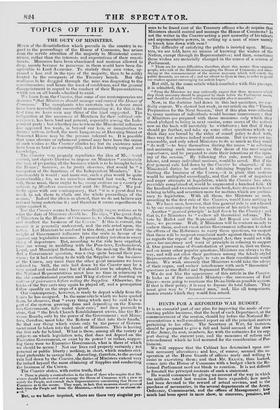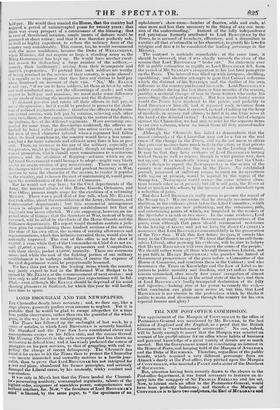HINTS FOR A REFORMED WAR BUDGET.
IT is an essential part of our plan for improving the mode of con- ducting public business, that the head of each Department, at the commencement of the session, should lay before the National Re- presentatives a well-considered report on all the principal matters' pertaining to his office. Time Secretary at War, for instance, should be prepared to give a full and lucid account of the state of the Army, its cost, numbers, &c. with the estimates for its sup- port during the current year, and the measures of reform and retrenchment which he had matured for the consideration of Par- liament.
We will suppose that the Cabinet has determined upon cer- tain necessary alterations; aml has, of course, secured the co- operation at the Horse Guards of officers ready and willing to assist in executing them; and that Mr. ELLICE, thus backed, comes into the House of Commons with a budget which the Re- formed Parliament need not blush to sanction. It is not difficult to forestall the principal contents of such a statement. He would commence by giving an account of the way in which the millions voted last session had been expended; how much had been devoted to the reward of actual services, and to the purchase of necessaries, in the several departments of the Army. Ordnance, Commissariat, and the offices of Management; how much had been spent in mere show, in sinecures, pensions, and
half-pay. Ile would then remind the House, that the country had enjoyed a period of uninterrupted peace for twenty years; that
there was every prospect of a continuance of the blessing; that In case of threatened invasion, ample means of defence could be procured at short notice; and that it was therefore perfectly safe, as well as highly expedient, to reduce the military force of the country very considerably. This course, too, be would recommend with the more confidence, because the Duke of WELLINGTON, when Minister, did not require so large a standing army as the Whig Governmeut has kept up. He would have another excel- lent reason for disbanding a large number of the soldiery,— mutely, their inefficiency ; arising from their ireemperate and thievi-h propensities. To pretend that such soldiers are worthy of being retained in the service of their country, is quite absurd : it is equally so to suppose that they have any claims to half-pay when dismissed on account of their vice. " No," Mr. Eeerett waild say, " if we are to have soldiers, let them at least be sober eel well-conducted men, not the offscourings of gaols ; and with respcet to half-pay and pensions, we must make some difference in our mode of treating the meritorious andehe ill-deserving."
To disband privates and retain all their officers in full pay, is out el. the question : but it would he prudent to preserve the skele- tons of reduced reeiments entire: therefore the officers might come into estual service, with full pay by rotation, relieving each other every two, three, or five years, according to the nature of the duties, the stations, &e. of the different regiments. Were recruiting sus- pended for some time, the disorderlies cashiered, the officers re- freshed by being called periodically into active service, and none but men of good character inlisted when a regiment had fallen below its fixed complement, the country would have a less num- rous,but a far more valuable and efficient army than it has at pre- sent. Then, an increase in the pay of the military, especially of the privates, might perhaps be granted; though an improved sys- tem el promotion, which should open commissions to meritorious privates, and the abolition of hogging—reforms which an en- lightened Government would be eager to adopt—might very likely mister an augmentation of pay unnecessary. These are some of the changes which our economical and prudent Secretary at War, :melees to raise the character of the service, to render it popular in the country, and to lessen the cost of maintaining it, would press upon the consideration of the House of Commons. But he would not stop here ; for the Civil departments of the Army, the internal allhirs of the Horse Guards, Ordnance, and War Office, present ample scope for the exertions of a rethrming Minister. There was a good deal of fine talk, when Mr. ELLICE first took office, about the consolidation of the Army, Ordnance, and Oemmissariat departments; but this economical arrangement (which is adopted in every military establishment but that of I:eel:mil) was never effected. We are supposing, however, an im- proved state of things; that the Secretary at War, instead of being thwarted, will be aided by the chiefs of the Horse Guards and the Ordnance departments. His report would therefore contain a judi- cious plan for consolidating these kindred sections of the service. The state of his own office, the s) stem of retiring allowances and superannuations, which has hitherto prevailed there, would also be materially improved. The cost of this office is not far short of KM/. a year, while that of the Commander-in-Chief does not ex- ceed e7,000/. a year. Then, the paymasters and Comptrollers, with their clerks, pocket 43,000/. annually. These are enormous sews; and while the cost of the fighting portion of our military establishmeat is to undergo reduction, of course the expense of the civil department would be proportionally lessened. We have thus put down the leading items which the country may justly expect to find in the Reformed War Budget to be opened by Mr. ELLICE at the commencement of next session ; and have only to add our hope that these just expectations will be ful- filled,—even although Mr. Eterce should be deprived of his usual shooting pleasures in Scotland, for which this year he will hardly have time to spare.



















 Previous page
Previous page